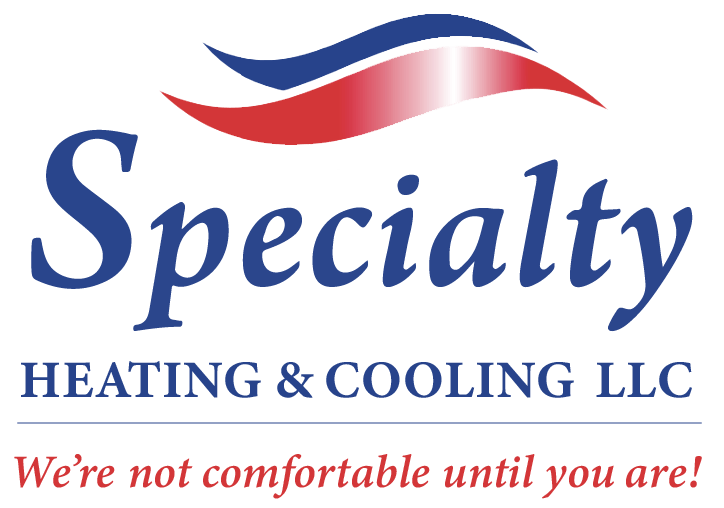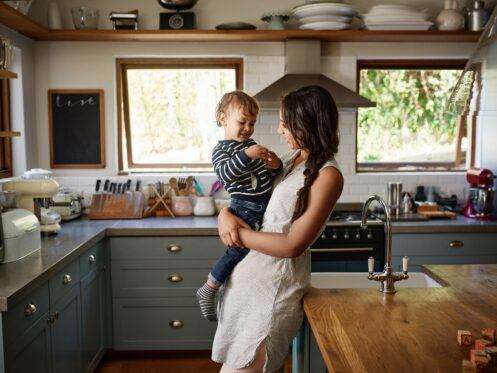As much as you might enjoy cooking at home, there’s no denying that it can affect your home’s indoor air quality. You’ve probably experienced this if you’ve ever let something burn on the stove or cooked something that smelled a bit off. Indoor air pollution from cooking usually isn’t as bad as pollution from other sources, but it can still present problems for you and your family. Fortunately, it’s also something that is fairly easy to keep under control. Part of this is simply being careful with how you use your oven and stove, but there are other tips that can help keep air pollution from cooking to a minimum.
Why Cooking Contributes to Indoor Air Pollution
Indoor air pollution increases whenever something is burned. Naturally, this includes the very act of cooking. Even if you’re careful not to burn your food, you’re still releasing foreign particles into the air whenever you cook anything. Most of this won’t harm you – it’s from food that you consume, after all, but it can add up and affect your home’s air quality. This can be a problem if you’re cooking with ingredients that someone in your home is allergic to or if you accidentally burn whatever you’re cooking. You also need to take into account the various chemicals and additives that are in some products or used in coatings on pans. Again, these things shouldn’t be harmful to most people, but it does contribute to indoor air pollution.
Cooking can also affect your home’s air quality if you’re using a gas stove. Gas stoves rely on natural gas, and while most of this is burned away when you turn on your burners, some still will get into the surrounding air. They also produce carbon monoxide, formaldehyde, and nitrogen oxides. These pollutants are released in small amounts and aren’t very dangerous if your stove is working properly, but it’s still something to keep in mind. Electric stoves obviously won’t release these materials, but they can still release particulate matter from anything that may have dripped or spilled on the burners.
Reducing Indoor Air Pollution From Cooking
Technically, it’s impossible to completely avoid indoor air pollution when you cook. As we said before, the very act of cooking releases particles and other materials into the air. However, there are plenty of things that you can do to keep the pollution to a minimum.
1. Be Careful When You Cook
First of all, be careful whenever you use your stove or oven to cook. Never leave pots and pans unattended on your stovetop, and always set a timer when you use your oven. Never cook something in the oven longer than you need to, and always turn off your oven and burners when you’re not using them. These all seem like basic cooking tips, but it’s easy to forget about something on the stove when you’re trying to prepare a meal for your family or forget that you left your oven on. Not only do cooking mishaps contribute to indoor air pollution, but they can also spell disaster if they’re severe enough.
2. Turn On Your Range Hood Fan
Whenever you cook something on your stovetop, turn on your range hood fan. The range hood is a hooded vent that is located above your stove that leads outside. When the fan is turned on, it pulls smoke and other particles outside.
If your home has a stove and oven, it should have a range hood. If you don’t have a range hood for whatever reason or if the range hood doesn’t lead outside, you’ll need to purchase one and have it installed. Look for a hood that has a capture efficiency of 80% or more. In the meantime, you can always set up a fan next to your stove and open a window in or near your kitchen.
3. Open A Window
Speaking of windows, you should always be ready to open at least one in your kitchen whenever you cook. You should be ready to open some windows even if it’s in the middle of winter and cold outside. You might hate the cold, but a few minutes of a chilly breeze is better than a smoke-filled kitchen. If you can, open at least two windows to create a cross breeze that gets rid of smoke and bad smells.
4. Keep Your Stove and Oven Clean
A lot of cooking-related air pollution comes from things that are already on your burners or in your oven, so make sure that you keep everything clean. Wipe down your stovetop whenever you’re done using it (once it cools, of course), and thoroughly deep clean your oven at least once every three months. If you’ve spilled or burned something in your oven, you might need to clean it more frequently than that. Keeping your stove and oven clean won’t just prevent fires and keep pollution to a minimum, but it will help ensure that your meals still taste great.
5. Keep Grilling Outdoors
While there are ways to grill meat indoors, grilling is still something that should be kept outside. It just creates too much smoke and is unsafe in a confined area. When you do use your grill, make sure to keep it a safe distance from your house and monitor whatever you’re grilling closely.
6. Invest in Air Purifiers
Finally, don’t forget about air purifiers for your home. You can pick up portable air purifiers from most department stores, but at Specialty Heating & Cooling LLC, we can also install in-duct air purifiers that connect to your HVAC system. This isn’t strictly cooking-related pollution, but it could improve your air quality if something goes wrong when you’re preparing your next meal.
Contact Us About Your Indoor Air Quality
Cooking anything can affect your home’s air quality, so you should always be careful whenever you’re preparing something in your oven or on your stove. These tips will certainly help improve your home’s air quality at dinner time, but indoor air pollution can have other sources.
If you’re concerned about your home’s air quality, don’t hesitate to contact Specialty Heating & Cooling LLC for assistance. Not only can our technicians install air purifiers in your home, but we can repair or replace your furnace or air conditioner if necessary. We can also install ductless heating and cooling systems, provide HVAC system enhancements for your home, or complete routine maintenance tasks to keep your heating and cooling systems working reliably in any weather. If you’re interested in a generator or water heater, we can offer installations and repairs. We also provide financing to those who qualify as well as many other specials to keep our products and services affordable for our clients.
For more information about our HVAC services or if you have questions or concerns about your home’s indoor air quality, contact Specialty Heating & Cooling LLC in Portland, OR today. Our technicians will be happy to assist you and answer all of your questions.

